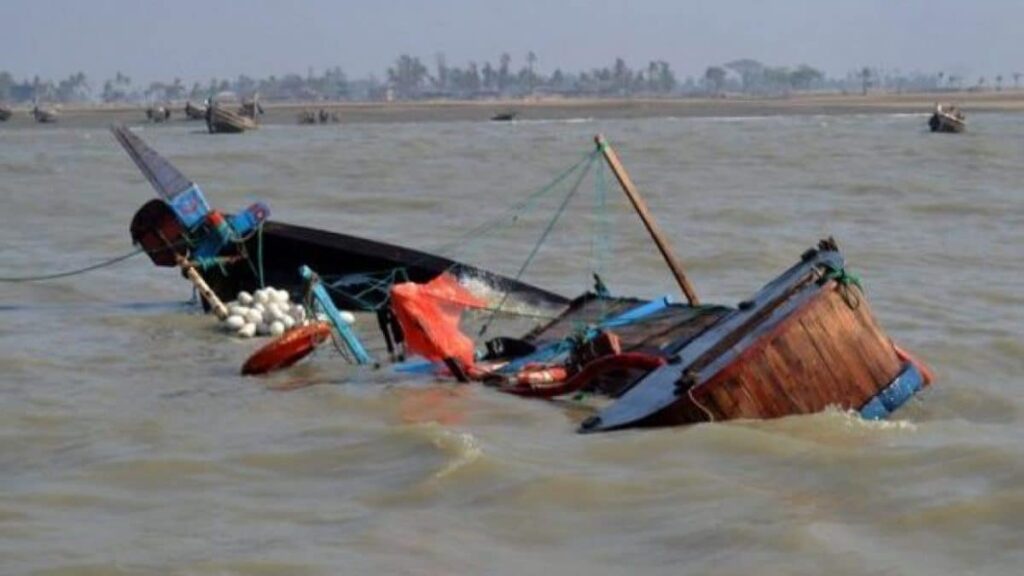
Another tragic incident unfolded on Wednesday, August 7, 2024, as reports surfaced of two separate boat accidents claiming the lives of at least 25 individuals in Jigawa and Bayelsa states, Nigeria.
The news deeply saddened many Nigerians who expressed concerns about the increasing frequency of such mishaps.
Many are calling for urgent intervention, criticizing the government’s negligence in ensuring the safety of water travelers.
One concerned Nigerian voiced, “It’s heartbreaking to see these recurring tragedies. The government must step up and prioritize the safety of its citizens.”
In Jigawa, a boat crossing the Gamoda River capsized in Taura Local Government Area, resulting in the death of five passengers with 15 others still missing.
The Police Public Relations Officer of Jigawa State Command, Lawan Shiisu Adam, confirmed the incident, stating, “A canoe carrying 20 passengers capsized, leading to the death of five individuals, with several passengers still unaccounted for.”
Similarly, in Bayelsa State, a wooden market boat carrying over 30 passengers caught fire and sank in the Ezetu Community River, claiming the lives of 20 individuals.
Authorities are working to recover the bodies and investigate the causes of both accidents.
Stakeholders in the maritime sector are pointing fingers at the operators’ failure to adhere to safety protocols and provide necessary safety equipment like life jackets.
Odede Dinikpete Tina, the chairperson of the Association of Coastal and Waterways Communities of Nigeria in Bayelsa State, emphasized the importance of compliance with safety measures and urged the government to improve infrastructure for safer water transportation.
The ongoing boat accidents across the country have prompted concerns about the overall safety of water travel in Nigeria.
Statistics from agencies reveal a disturbing trend of boat accidents causing significant loss of lives over the years.
Experts attribute these incidents to various factors such as overloading, non-compliance with safety regulations, and the use of outdated watercraft.
Marine engineer Kayode Johnson highlighted the urgent need for improved safety measures on waterways to prevent further tragedies.
He emphasized the importance of strict enforcement of safety regulations and the need for all stakeholders to prioritize the security of passengers and crew.
Addressing these challenges requires a collective effort from government agencies, operators, and the public to enhance safety standards and prevent future disasters.
Ensuring the safety of water travelers should be a top priority to avoid the loss of lives and protect the economic and environmental well-being of the nation.
Improving safety consciousness in water transport requires collaboration among all stakeholders involved, including ferry operators, jetty owners, and passengers,” emphasized a transportation expert, Samuel Odewunmi.
Highlighting overloading as a leading cause of boat accidents, Professor Odewunmi also criticized operators for engaging in risky behaviors like consuming alcohol and other dangerous substances.
Addressing the issue of overloading, he explained how exceeding a boat’s capacity can lead to capsizing even with minor turbulence.
Referring to instances of engine failures midstream, he attributed mishaps to the poor condition of some boats.
Professor Odewunmi stressed the importance of effective regulation, particularly citing the lax enforcement by Lagos State Waterways Authority (LASWA).
Emphasizing the need for boats to cease operations by early evening, he pointed out that many continue to operate at night, underscoring the weak enforcement in the transportation sector.
Olapade Peter, a member of Nigeria Merchant Navy Officers and Water Transport Senior Staff Association (NMNO/WTSSA), called for a thorough examination of all boats operating on waterways to identify those needing replacement.
He advocated for regular training and certification of boat operators to ensure competence and adherence to safety measures.
Noting the reluctance of operators and passengers to use life jackets, Peter suggested strict enforcement to mandate their use for all individuals on boats.
He urged regulatory authorities to monitor jetties, identify wrecks, and ensure the proper wearing and inspection of life jackets during embarkation and disembarkation.
Citing alcohol consumption and adverse weather conditions as contributing factors to accidents, Peter called for strict adherence to regulations prohibiting alcohol intake by boat drivers.
A police marine officer underscored the challenge of regulating boat operators, particularly in ensuring the use of safety appliances like life jackets to prevent accidents.
Regarding certification for boat drivers, the officer explained the varying requirements for different categories of waterway users and emphasized the enforcement of safety protocols.
Recklessness among waterways users, including engaging in drunkenness, was identified as a major concern contributing to accidents on the water.
Expressing frustration with government agencies’ failure to protect lives on waterways, a resident criticized the lack of adequate policing of water routes and enforcement of safety measures.
He called for more stringent measures to ensure the safety of individuals using water transport and emphasized the critical importance of regulatory agencies fulfilling their responsibilities.
